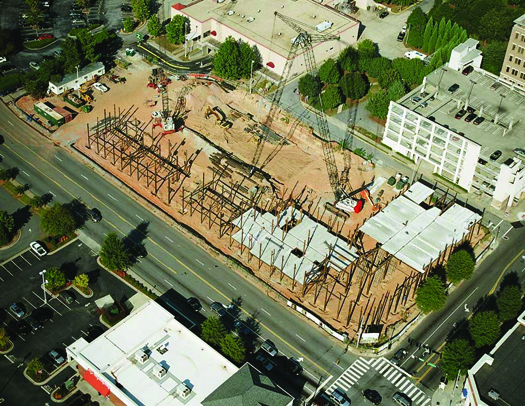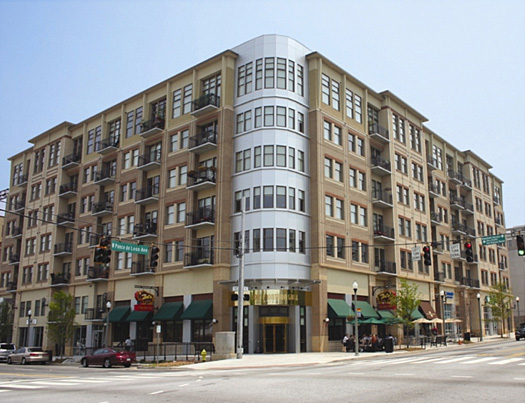Completed 2006
The Artisan is a two phase, mixed-use development with residential and street retail on a 1.928 acre site at the northeast corner of West Ponce de Leon and Commerce Drive. The first phase was approved at 105 units — seven of which were two level townhouses with street front access and two of which were Live/Work units with street level commercial space and a level of residential above. The first phase included 12,000 square feet of street level retail and the required structured parking providing a total of 373 spaces. The second phase of the project added an additional 57 residential units.
The original project proposal included a 20% density bonus to support the inclusion of affordable housing units under a program developed in cooperation with the developer and the Decatur Housing Authority. The city’s zoning requirements for the downtown commercial districts allows for 70 units an acre or 135 units for this site. The density bonus provided for an additional 27 units for a total of 162 dwelling units. Of this total number of units, 17 were to be set aside as Lifecycle (Affordable) housing units — 13 in phase one and 7 in phase two.
The Decatur Downtown Development Authority sold a surface parking lot as part of this land assembly and required the replacement of 113 public parking spaces in the parking deck as part of the sales agreement.
Phase one followed a trend in downtown Decatur with strong sales in the larger two bedroom units and slower sales in the one bedroom units. This reinforced the reality at the time of a market skewed toward empty nesters interested in larger units and more amenities. As a result of this trend, some buyers purchased two units and combined them for large two and three bedroom units resulting in a reduction of the total number of units in phase one from the projected 105 units to fewer than 75.
This interest in larger units was reflected in the difficulty to attract buyers for the affordable units. The developer planned all of the affordable units as one bedroom units and proposed a $20,000 subsidy with a 10 year equity restriction. We found that young buyers as well as qualifying empty nesters were not interested in one bedroom units with such a long equity restriction. Because the number of total units was reduced, we allowed the developer to reduce the number of affordable units in the first phase from 13 to 9, increased the subsidy from $20,000 per unit to $30,000 per unit and dropped the 10 year equity restriction but required that the initial $30,000 subsidy be repaid to the Decatur Housing Authority when the unit was resold.

The Artisan project, under construction in 2005.

The completed Artisan as it appears today.
